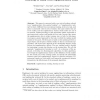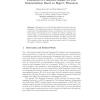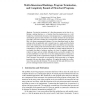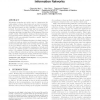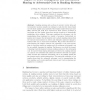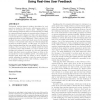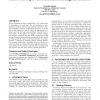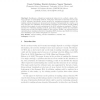AIRS
2010
Springer
13 years 10 months ago
2010
Springer
This paper is concerned with a new task of ranking, referred to as "supplementary data assisted ranking", or "supplementary ranking" for short. Different from c...
TSD
2010
Springer
13 years 10 months ago
2010
Springer
Abstract. Evaluation is one of the hardest tasks in automatic text summarization. It is perhaps even harder to determine how much a particular component of a summarization system c...
SAS
2010
Springer
13 years 10 months ago
2010
Springer
Abstract. Proving the termination of a flowchart program can be done by exhibiting a ranking function, i.e., a function from the program states to a wellfounded set, which strictl...
PVLDB
2010
13 years 10 months ago
2010
Ranking is a fundamental operation in data analysis and decision support, and plays an even more crucial role if the dataset being explored exhibits uncertainty. This has led to m...
KDD
2010
ACM
13 years 11 months ago
2010
ACM
Information networks are widely used to characterize the relationships between data items such as text documents. Many important retrieval and mining tasks rely on ranking the dat...
IFIPTM
2010
13 years 11 months ago
2010
Ranking systems such as those in product review sites and recommender systems usually use ratings to rank favorite items based on both their quality and popularity. Since higher ra...
CIKM
2010
Springer
13 years 11 months ago
2010
Springer
In this paper we investigate the task of Entity Ranking on the Web. Searchers looking for entities are arguably better served by presenting a ranked list of entities directly, rat...
CIKM
2010
Springer
13 years 11 months ago
2010
Springer
Traditional machine-learned ranking algorithms for web search are trained in batch mode, which assume static relevance of documents for a given query. Although such a batch-learni...
SAC
2008
ACM
13 years 12 months ago
2008
ACM
When developing semantic applications, the construction of ontologies is a crucial part. We are developing a semiautomatic ontology construction approach, OntoCase, relying on ont...
JUCS
2007
14 years 9 days ago
2007
Abstract: Ranking is a ubiquitous requirement whenever we confront a large collection of atomic or interrelated artifacts. This paper elaborates on this issue for the case of RDF s...
